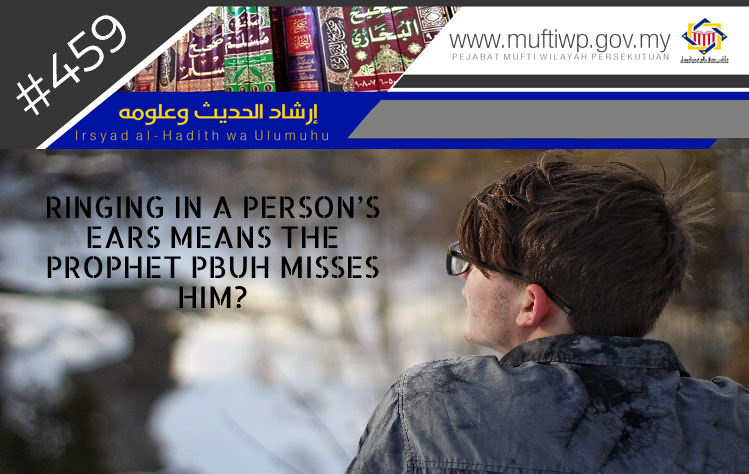Question:
Is it true that if there is a ringing in a person’s ears it means the Prophet PBUH misses him?
Answer:
Alhamdulillah, praise and thanks to Allah for the countless blessings He has blessed us all with. Blessings and salutations to the Prophet Muhammad PBUH, his wives, his family, companions and all those that follow his teachings to the day of judgement.
The Prophet Muhammad PBUH is a special human and the best example for all as recorded by Allah SWT in the Quran. Furthermore, it is an obligation on us to love the Prophet PBUH as stated in a verse in surah al-Tawbah:
- Allah SWT states:
قُلْ إِن كَانَ آبَاؤُكُمْ وَأَبْنَاؤُكُمْ وَإِخْوَانُكُمْ وَأَزْوَاجُكُمْ وَعَشِيرَتُكُمْ وَأَمْوَالٌ اقْتَرَفْتُمُوهَا وَتِجَارَةٌ تَخْشَوْنَ كَسَادَهَا وَمَسَاكِنُ تَرْضَوْنَهَا أَحَبَّ إِلَيْكُم مِّنَ اللَّـهِ وَرَسُولِهِ وَجِهَادٍ فِي سَبِيلِهِ فَتَرَبَّصُوا حَتَّىٰ يَأْتِيَ اللَّـهُ بِأَمْرِهِ ۗ وَاللَّـهُ لَا يَهْدِي الْقَوْمَ الْفَاسِقِينَ
Say, [O Muhammad], "If your fathers, your sons, your brothers, your wives, your relatives, wealth which you have obtained, commerce wherein you fear decline, and dwellings with which you are pleased are more beloved to you than Allah and His Messenger and jihad in His cause, then wait until Allah executes His command. And Allah does not guide the defiantly disobedient people."
Surah al-Tawbah (24)
Syeikh al-Sa’di said that the above noble verse states our obligation in loving the Prophet PBUH more than anything.
According to the above question, first we will cite the narration where it is mentioned that it is said if a person hears a ringing in his ears, then it is a sign that the Prophet PBUH misses him.
- It is claimed that the Prophet PBUH said:
إِذَا طَنَّتْ أُذُنُ أَحَدِكُمْ فَلْيَذْكُرْنِي وَلْيُصَلِّ عَلَيَّ وَلْيَقُلْ: اللَّهُمَّ اذْكُرْ بِخَيْرٍ مَنْ ذَكَرَنِي
“When there is a ringing in one’s ears, then he should recite praise and salutations upon me and say: May Allah SWT reminds me of the one who is reminded of me with goodness.”
The above narration is narrated by Imam al-Thabarani in al-Mu’jam al-Awsath (9222), al-Mu’jam al-Saghir (1104) and al-Mu’jam al-Kabir (958). Furthermore, it is also narrated by Imam Ibn al-Sunni in his book ‘Amal al-Yaum wa al-Lailah (166). Thus, here, we include the opinions of scholars in determining and evaluating the status of this hadith:
- Imam Ibn al-Jauzi (597 H) stated that the hadith is mawdu’ (fake/ fabricated). [See: al-Mawdhu’at, 3/76]
- Imam al-Sakhawi (902 H) said that the sanad of this hadith is weak (dhaif). Moreover, al-‘Uqailiy states that the hadith do not have an origin. [See: al-Maqasid al-Hasanah, 89]
- Imam al-Fattani (986 H) evaluated the hadith as mawdu’ and he cited the opinion of al-Sakhawi and al-‘Uqailiy. [See: Tazkirah al-Mawdhu’at, 166]
- Syeikh Mir’I bin Yusuf al-Maqdisi (1033 H) said the hadith is mawdu’. [See: al-Fawaid al-Mawdhu’ah, 133]
We are inclined towards the opinion that the hadith is not sahih. Hence, it is impermissible and haram for us to narrate a hadith which is not sahih when we know of its status (mawdu’) unless when explaining that it is fabricated.
Conclusion
To conclude, the above hadith is not sahih and it is haram to spread or narrate the hadith unless in stating that it is fabricated as explained above. It is included as an obligation for us in maintaining and protecting our Prophet Muhammad PBUH from any form of deception that is referred to be from him. Furthermore, identifying the sahih status of a hadith is important for the Prophet PBUH warns against those who lie on his name (hadith). This is stated in a hadith of the Prophet PBUH:
مَنْ حَدَّثَ عَنِّي بِحَدِيْثٍ يُرَىْ أَنَّهُ كَذِبٌ فَهُوَ أَحَدُ الْكَاذِبِيْنَ
"Whoever narrates a Hadith from me thinking it to be false, then he is one of the liars."
See Muqaddimah Sahih Muslim
Lastly, may Allah SWT make us from among those who love knowledge and bless us with understanding in religion and protect us from making mistakes in narrating the hadith of the Prophet PBUH. Amin.
Wallahua’lam.


